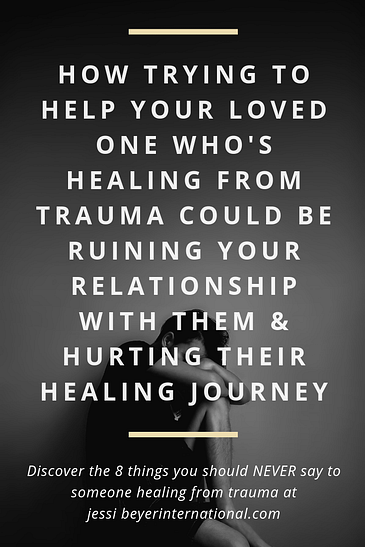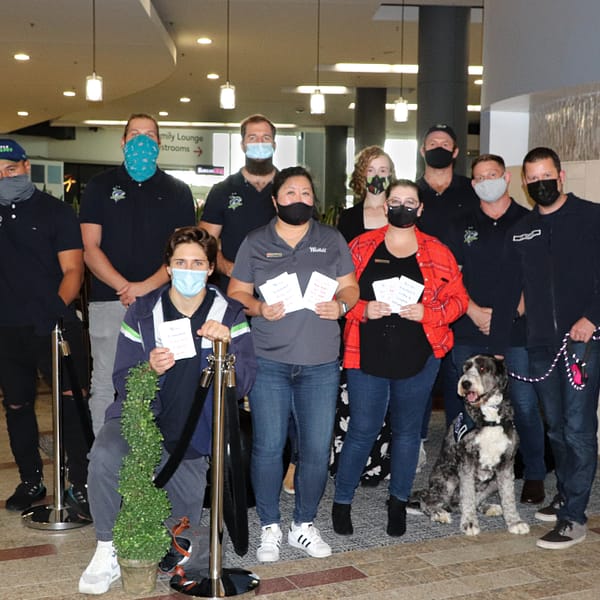When someone you love is going through something traumatic, the first thing you want to do is be there for them, and while that’s fantastic, certain things you say can do more harm than good. While you may be well-intentioned, it often doesn’t sit right with the survivor and can often come across and insincere or ignorant. Avoid saying these common phrases and platitudes, and you can preserve your relationship with that person AND help them heal like you were trying to do all along.
Psst! If you want even more tips for being a great support system for a trauma survivor, check out the last chapter in my #1 best-selling book, How To Heal.

“I know what you’re going through.”
Um… no you don’t! Unless you went through the exact – and I mean exact – same trauma and have the same physiological and psychological makeup as your friend or family member, you don’t know what they’re going through. Saying this can seem like your minimizing the effect of the trauma: “Oh, it’s no big deal, I went through the same thing!” For the survivor, this trauma is incredibly important and incredibly hurtful, and, even more importantly, it’s theirs. While they may not want it to be this way, they own their experiences and their emotions. Don’t take that away from them.
“I’m so sorry for you.”
When you tell someone healing from a trauma that you’re sorry for them, you’re labeling them as a victim and someone requiring sympathy. They are stronger than imaginable for surviving a trauma and coming out the other side. Furthermore, law enforcement and medical professionals may already be labeling them as a victim, and they may be labeling themselves as one, too. Victims are traditionally weak, helpless, and in need of saving – not a pretty or productive mindset to have, and potentially quite embarrassing, too. Don’t add to that label by indirectly calling them a victim.
“It could be worse!”
How is this helpful? If anyone out there thinks this is a helpful thing to say to someone, please get in touch with me, because I’d love to have a discussion with you about this. Similarly to telling someone that you know what they’re going through, telling them that it could be worse tells them that their emotions and reactions are over-the-top and unwarranted. Every individual responds to trauma differently, and every response is absolutely okay. It is utterly useless to compare the severity of trauma. A favorite saying of mine goes something like this: The person who drowned in 1 foot of water and the person who drowned in 20 feet of water are both dead. Any trauma survivor is hurting, struggling, and trying to heal – it doesn’t matter whose trauma was “worse”.
“It’ll be okay.”
It might not, or it might not for a while, and that’s perfectly okay. Saying this to someone does one of two things (or perhaps both). First of all, it places some imaginary timeline on their healing. Some people recover from a traumatic incident in a week, and some people take twenty years. Every individual needs to work through the healing process at their own pace, and if they’re not “okay” for twenty years – that’s okay, too. Secondly, telling a survivor that implies that everything goes back to normal after they heal. Sometimes it doesn’t. A lot of times it doesn’t. Going through something so deep and emotional can change a person, and while I’ll discuss the specifics of this in the next and final chapter, the person isn’t always the same at the other end of it. This is “okay”, too, but it’s a new version of “okay” that might take some getting used to. Allow them to feel their pain for as long as they need.
A friend of mine who lost her father when she was seven years old told me that this was one of the least helpful things that her friends and family members said to her during the time immediately following her loss. While she was thankful for their support and felt that they played a key role in her healing process, hearing this from them felt like they were invalidating or glossing over her feelings and not giving her the time she needed to grieve. She knew it would be okay eventually, but it wasn’t okay right then, and she needed to know that it was okay to not be okay. If your friend or family member has been through a traumatic event, keep this friend of mine in mind, as you don’t want your friend or family member to experience the same emotions from your attempt to help. Instead, love them, accept them, and support them, but most importantly, allow them to heal at their own rate.
“They didn’t mean to hurt you!”
This is probably the most irrelevant thing that you could say to someone healing from a trauma, and I don’t mean to be harsh by saying that. I don’t care if someone meant to give someone 1,000 pounds of gold but accidentally dropped it on their head – the person is still hurt. The same thing applies to trauma. The focus of the healing journey should not be the intention of the person who caused the trauma but on the reaction of the person who experienced the trauma. There’s really no other way to phrase this: it doesn’t matter what the person who caused the trauma intended, whether they’re a “good person” or not; the person who experienced the trauma is deeply hurt, and you, as the person helping them through the trauma, would be smart to remember that distinction.
“Get over it.”
I’m hoping that none of you out there would think that this is a good thing to say to someone, but sadly, many people have experienced this reaction from someone that they’re close with. This not only deeply harms the healing journey that the trauma survivor is going on, but it puts up a giant brick wall between you and the survivor. By telling them this, you’re telling them that their feelings are too dramatic and that they’re taking too long to deal with what happened to them. As I’ve said before, each healing journey is unique, and you have no way to know how far along someone is or how hard they’ve fought to get to where they are without being them – and you’re not.
“Come on, you should really talk about it!”
Everyone processes their trauma at their own rate, and having you sitting there bugging them to talk about it could force them to speak when they’re not ready or push you away from them. A key point in trauma healing is to go at the survivor’s pace, whether you’re the therapist or a friend or family member just trying to help. Pushing them to take a step before they’re ready could be anywhere from impossible to destructive.
When you’re reacting in this way and getting all upset because someone won’t tell you about their trauma, then you need to take a serious look at yourself and ask if you’re wanting to help them because you want them to get better or you’re wanting to ‘help them’ to satisfy your own curiosity. If it’s the latter, it is possible to change and become a safe support system for your friend or family member, but don’t make them question what your motives are when you’re trying to help them.
“You should do/try ______.”
Your best role as a friend or family member is to be there and support them – not give them advice on how to heal. If you don’t have training as a psychological or psychiatric professional, then you are not qualified to give them advice. Even if you’ve been through a trauma healing process yourself, there’s no guarantee that what worked for you will help them, and you run the risk of harming their healing process if you tell them what to do without having the proper professional training and understanding of their unique situation. If you are someone who has professional training in the field, I would still not recommend giving them advice; rather, direct them to one of your colleagues or suggest a method of therapy that they should pursue.
Take these phrases and REMOVE them from your vocabulary, and you’ll be better equipped to help your loved one as they’re healing.
With love,
Jessi Beyer
PS — If you’re looking for more ways to be a great support system for a trauma survivor (beyond just what not to say!), check out the final chapter in my #1 best-selling book, How To Heal!

